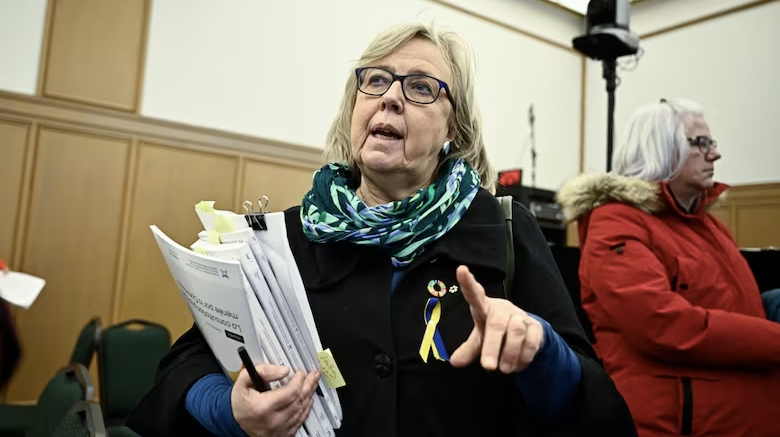Green Party Leader Calls for Urgent Action on Foreign Interference Reforms Before Next Election
Lucas Tremblay
1/29/20253 min read


Green Party Leader Elizabeth May is calling on federal parties to work together to swiftly implement key recommendations from Justice Marie-Josée Hogue’s inquiry into foreign interference before the next election.
Hogue’s report, released on Tuesday, includes 51 recommendations, with 24 identified as priorities that should be enacted before Canadians head to the polls. However, Prime Minister Justin Trudeau’s decision to prorogue Parliament while the Liberal Party holds a leadership race means any legislative changes—including updates to the Canada Elections Act—are currently stalled. With opposition parties expected to vote against the minority Liberal government when Parliament resumes on March 24, a federal election could be imminent.
May is urging leaders to act quickly. “In the interest of Canada, we come together, put these measures in place, and ensure they are identified in the speech from the throne for unanimous consent,” she said. According to her, Parliament could push through some of these changes in as little as 30 minutes if there is agreement.
She also emphasized that political parties can take independent steps to implement certain recommendations, such as ensuring that all party members are Canadian citizens or permanent residents.
Government Response and Political Divisions
Despite the urgency, the federal government is not yet committing to immediate action. Public Safety Minister David McGuinty and Democratic Institutions Minister Ruby Sahota announced additional funding to combat foreign interference on Tuesday. However, Sahota’s office stated that the government needs time to fully review the report before determining whether any measures can be implemented before the next election.
"We need to study the full report and its recommendations before making commitments," said Myah Tomasi, director of communications for Minister Sahota.
NDP Leader Jagmeet Singh said his party supports implementing the recommendations that apply to political parties but noted that legislative changes fall under the government’s responsibility. He criticized the Liberals for proroguing Parliament, saying they could have kept it open to pass needed reforms.
“They could have not prorogued Parliament, and we would have been able to act on this,” Singh said. “They could recall Parliament right now if they were serious about implementing Justice Hogue’s recommendations.”
Bloc Québécois Leader Yves-François Blanchet took a different stance, arguing that if the Liberals want to act quickly on the inquiry’s findings, they should trigger an election. He did not commit to his party proactively adopting changes related to political parties, stating that parties operate as private entities.
Conservative Leader Pierre Poilievre’s office acknowledged that the report validated concerns the party has raised for the past two years about foreign interference but did not specify whether the Conservatives would support implementing the recommendations before the election.
Foreign Interference and the Election System
Hogue’s inquiry confirmed that foreign governments have attempted to meddle in Canada’s democratic institutions. While she found no evidence that these efforts have significantly influenced past elections, she warned that the threat is real and growing.
“There are a number of foreign states actively working to secretly—and often illegally—interfere in our democratic institutions,” Hogue wrote.
A major area of concern is the role of disinformation on social media platforms, which she identified as a rising form of foreign interference. “Disinformation is particularly difficult to combat, and efforts to regulate social media have largely failed,” she noted.
Key Recommendations for Election Security
Hogue’s report includes several proposed reforms to safeguard the electoral system, including:
Restricting participation in party nomination and leadership contests to Canadian citizens and permanent residents.
Updating elections law to prohibit foreign entities from influencing votes at any stage, including nomination and leadership contests.
Banning foreign contributions to third-party organizations engaged in election-related activities.
Requiring clear labeling for paid and unpaid election communications that are generated or manipulated by artificial intelligence.
Expanding election laws to prohibit false information intended to undermine election legitimacy.
Strengthening existing fraud and misinformation laws to cover nomination and leadership races.
Security and intelligence expert Wesley Wark, a senior fellow at the Centre for International Governance Innovation, said the recommendations are valuable, particularly those focused on intelligence improvements and increasing awareness among parliamentarians. However, he cautioned that legislative changes take time.
“These recommendations will be the responsibility of the next government, regardless of which party forms it,” Wark said. “The challenge will be determining which reforms are practical and how quickly they can be implemented.”
Uncertain Path Forward
With a potential federal election looming, the fate of Hogue’s recommendations remains uncertain. While some political leaders express support, the lack of immediate action and deep political divisions may delay meaningful reforms. As foreign interference threats continue to evolve, the question remains: will Canada act quickly enough to protect its democratic institutions before the next vote?
News
Stay updated with the latest BC news stories, subscribe to our newsletter today.
SUBSCRIBE
© 2025 Innovatory Labs Inc.. All rights reserved.
LINKS
